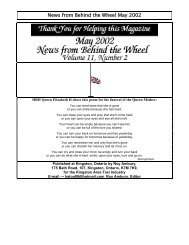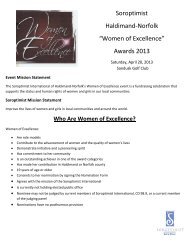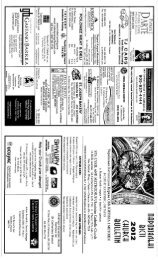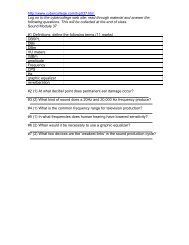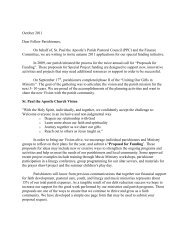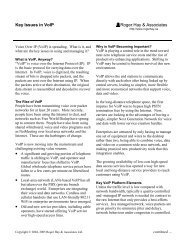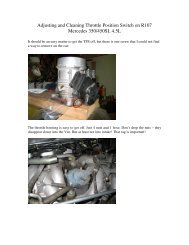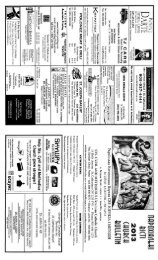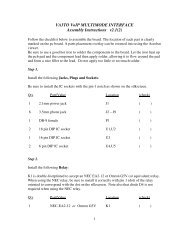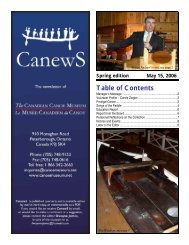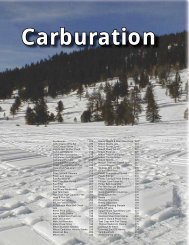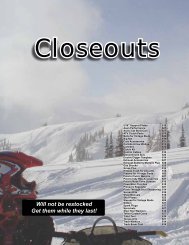SVN3M HOLY TRINITY June 19, 2012 CULMINATING ... - Cogeco
SVN3M HOLY TRINITY June 19, 2012 CULMINATING ... - Cogeco
SVN3M HOLY TRINITY June 19, 2012 CULMINATING ... - Cogeco
Create successful ePaper yourself
Turn your PDF publications into a flip-book with our unique Google optimized e-Paper software.
<strong>SVN3M</strong> <strong>HOLY</strong> <strong>TRINITY</strong> <strong>June</strong> <strong>19</strong>, <strong>2012</strong><br />
<strong>CULMINATING</strong> ORAL EXAMINATION<br />
Exam structure:<br />
The examination will assess the following fundamental ideas identified in the<br />
<strong>SVN3M</strong> 2008 revised curriculum document 1 :<br />
a. Scientific Solutions to Contemporary Environmental Challenges.<br />
i. Current environmental issues are complex, and may involve<br />
conflicting interests or ideas. Scientific knowledge enables people<br />
to make informed decisions about effective ways to address<br />
environmental challenges.<br />
b. Human Health and the Environment<br />
i. Environmental factors can have negative effects on human<br />
health. It is possible to minimize some of the negative health<br />
effects of environmental factors by making informed lifestyle<br />
choices and taking other precautions.<br />
c. Sustainable Agriculture and Forestry<br />
i. Modern agricultural and forestry practices can have positive and<br />
negative consequences for the economy, human health, and the<br />
sustainability of ecosystems, both local and global.<br />
d. Reducing and Managing Waste.<br />
i. Well-thought-out waste management plans help to sustain<br />
ecosystems, locally and globally.<br />
ii.<br />
By making informed choices, consumers can reduce the amount<br />
or alter the nature of the waste they produce.<br />
e. Conservation of Energy<br />
i. The impact of energy production and consumption on<br />
environmental sustainability depends on which resources and<br />
energy production methods are used.<br />
The assessment will consist of an oral examination based on three issues proposed by the<br />
student and for which the student has prepared “doable” solutions grounded on the above five<br />
expectations (“Big Ideas”).<br />
As part of their semester evaluation students were asked to prepare a series of “posters” or a<br />
2<br />
PowerPoint presentation summarizing the course concepts and their connections . The<br />
question thread linking the “Big Ideas” will require the use of specific basic information<br />
contained in these summaries. Thes summaries are required material during the examination<br />
Students are requested to be five minutes prior to the beginning of their evaluation time at the<br />
back door of Room 307. Come in and find a desk with folders containing your selected main<br />
topic.
<strong>SVN3M</strong> <strong>HOLY</strong> <strong>TRINITY</strong> <strong>June</strong> <strong>19</strong>, <strong>2012</strong><br />
<strong>CULMINATING</strong> ORAL EXAMINATION<br />
Student Name Topic & time given Time Assigned<br />
1 8:25 8:30<br />
2 8:40 8:45<br />
3 KATIE 8:55 9:00<br />
4 MADDIE 9:10 9:15<br />
5 MICHELLE 9:25 9:30<br />
6 MAEVE 9:40 9:45<br />
7 MATTHEW 9:55 10:00<br />
8 MICHELLE M 10:10 10:15<br />
9 LAURA 10:25 10:30<br />
10 ANDREA 10:40 10:45<br />
11 JENNA 10:55 11:00<br />
12 ANNALIESE 11:10 11:15<br />
Evaluation Rubric<br />
Name:___________________________________<br />
Component Notes R L1 L2 L3 L4<br />
Knowledge<br />
Topic of Unit 5. Identifies in the issues chosen ecological and<br />
environmental components with learned concepts about<br />
carrying capacity - limits to the environment - footprint<br />
Topic of Unit 6. Identifies in the issues chosen ecological and<br />
environmental components with learned concepts about<br />
pollution and pollution sources<br />
Topic of Unit 7. Identifies in the issues chosen ecological and<br />
environmental components with learned concepts about matter<br />
cycles and ecosystem sustainability<br />
Topic of Unit 8. Identifies in the issues chosen ecological and<br />
environmental components with learned concepts about<br />
hydrological cycles water pollution, natural water purification<br />
Topic of Unit 9. Identifies in the issues chosen ecological and<br />
environmental components with learned concepts about<br />
biodiversity and ecosystem function<br />
Topic of Unit 10. Identifies in the issues chosen ecological and<br />
environmental components with learned concepts about<br />
ecosystem energy cycles and sources. Conversion and<br />
production of energy technologies<br />
Topic of Unit 11. Identifies in the issues chosen ecological and<br />
environmental components with learned concepts about<br />
importance of the atmosphere in weather and climate. Source<br />
and type of pollutants<br />
Topic of Unit 12. Identifies in the issues chosen ecological and<br />
environmental components with learned concepts about<br />
ecological impact of climate change
<strong>SVN3M</strong> <strong>HOLY</strong> <strong>TRINITY</strong> <strong>June</strong> <strong>19</strong>, <strong>2012</strong><br />
<strong>CULMINATING</strong> ORAL EXAMINATION<br />
Inquiry/Thinking<br />
Is able to propose (outline) a realistic solution. Solution is<br />
sourced if not original<br />
The proposed solution is critically assessed and limitations are<br />
identified<br />
The solution is supported by evidence or a logical train of<br />
justifications<br />
Communication<br />
Summaries are clearly outlined<br />
Bibliographic research is consistent and sources complete<br />
Is able to convey ideas<br />
clearly,<br />
concisely,<br />
and using learned terminology<br />
3<br />
Examination UNITS based on: The Habitable Planet: A Systems Approach to Environmental Science .<br />
5. Human Population Dynamics<br />
6. Risk, Exposure, and Health<br />
7. Agriculture<br />
8. Water Resources<br />
9. Biodiversity Decline<br />
10. Energy Challenges<br />
11. Atmospheric Pollution<br />
12. Earth's Changing Climate<br />
Sources:<br />
1. Le curriculum de l’Ontario, 11e et 12e année – Sciences, 2008.<br />
2. http://home.cogeco.ca/~feren/<strong>SVN3M</strong>%20Ecology%20and%20EnviroSci%20Con<br />
cpts%20Terms%20and%20Monitoring%20V2..pdf<br />
3. Learners.org, Anneberg Foundation 2011. The Habitable Planet: A Systems<br />
Approach to Environmental Science.<br />
http://www.learner.org/resources/series209.html



